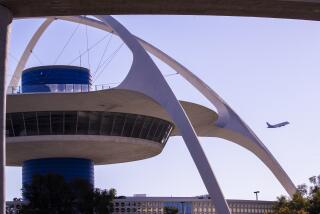Secret military exercises change approach for some LAX flights
- Share via
A series of military operations off the Southern California coast that likely included a missile test over the weekend is forcing flights approaching Los Angeles International Airport in the middle of the night to fly over South L.A.
About 150 commercial, cargo, military and private flights that land at LAX from midnight to 6:30 a.m. daily and fly in eastward over the ocean will instead have to fly in from the opposite direction through Thursday, airport officials said.
The mandate comes from the Federal Aviation Administration, which told LAX the military airspace over the ocean west of the airport is closed from last Friday to Thursday, said airport spokeswoman Nancy Castles.
The change means thousands of residents west of the 110 Freeway and east of LAX will hear the flights descending every three to four minutes on average in the middle of the night. That approach path is usually limited to daytime hours.
The only other time flights change their approach during the year is for Santa Ana winds, which occurs 10 to 20 times a year, she said.
NEWSLETTER: Get the day’s top headlines from Times Editor Davan Maharaj >>
“But if it’s flying over your house over the east and you’ve gone 40 years expecting it not to…” Castles said. “The neighbors understand.”
Flights can still take off westbound and ascend over the ocean, Castles said.
Though LAX officials notified the media about the change Friday, Castles said her office didn’t receive a flood of questions about it until Saturday night, when people from San Diego County to the Bay Area noticed a mysterious white cone of light streaking across the night sky.
It was an unarmed test of the Trident II (D5) missile off the coast, the Navy said.
John Daniels, a public affairs officer for the Navy’s Strategic Systems Programs, said that the test Saturday and the others scheduled are classified and thus not announced in advance. Although notice was given to aviation officials and sailors in the area, it did not detail the exact time or location of the launch, he said.
Witnesses across Southern California and Arizona posted video and reported seeing the light. Many used hashtags such as #ufo and #comet as they speculated about its source.
Video blogger Julien Solomita was on a rooftop parking lot in Van Nuys shooting traffic and sunset scenes when he looked up and saw a bright circle of light in the sky. He followed it with his camera and at one point, he said, it looked like it was exploding.
“For a brief moment, when the cloud got bigger, I was wondering, ‘Should we run?’ It looked so close,” he said.
Since it was posted, his YouTube video has gotten nearly 1.5 million views and has been widely circulated on social media, helping to set off a furious round of speculation – was it a UFO? A missile? A comet?
The need for secrecy Saturday was all the more important given the type of weapon the Navy was testing, said Loren Thompson, a military analyst with the Lexington Institute.
The Trident II (D5) missile is a centerpiece of the U.S. military’s ability to deter a nuclear attack, and an ongoing effort to modernize the weapon is a top priority, he said.
Knowing that a Trident was going to be tested would give prying eyes — sailors on a Russian submarine in the Pacific, for example — the ability to gather valuable information, Thompson said. Tracking the missile’s trajectory, speed, electromagnetic emissions and other characteristics in real time could provide insights into potential vulnerabilities.
Staff writers Garrett Therolf, W. J. Hennigan and Joel Rubin contributed to this report.
For breaking California news, follow @JosephSerna.
ALSO
Early morning shootings leave 1 dead, 2 wounded in Lennox
L.A. Board of Education will weigh Broad charter-expansion plan
Walton foundation sustains local funding for Teach For America with new grant
More to Read
Sign up for Essential California
The most important California stories and recommendations in your inbox every morning.
You may occasionally receive promotional content from the Los Angeles Times.











